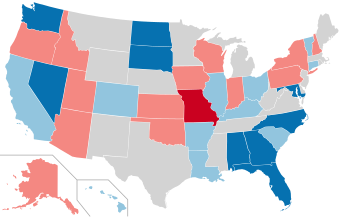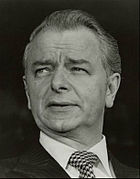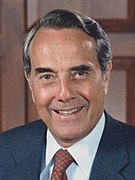| ||||||||||||||||||||||||||||||||||||||||
34 of the 100 seats in the United States Senate 51 seats needed for a majority | ||||||||||||||||||||||||||||||||||||||||
|---|---|---|---|---|---|---|---|---|---|---|---|---|---|---|---|---|---|---|---|---|---|---|---|---|---|---|---|---|---|---|---|---|---|---|---|---|---|---|---|---|
| ||||||||||||||||||||||||||||||||||||||||
 Results of the elections: Democratic gain Democratic hold Republican gain Republican hold No election Rectangular inset (North Carolina): both seats up for election | ||||||||||||||||||||||||||||||||||||||||
| ||||||||||||||||||||||||||||||||||||||||
The 1986 United States Senate elections were elections for the United States Senate. Held on November 4, in the middle of Ronald Reagan's second presidential term, the 34 seats of Class 3 were contested in regular elections. The Republicans had to defend an unusually large number of freshman Senate incumbents who had been elected on President Ronald Reagan's coattails in 1980. Democrats won a net of eight seats, defeating seven freshman incumbents, picking up two Republican-held open seats, and regaining control of the Senate for the first time since January 1981. This remains the most recent midterm election cycle in which the sitting president's party suffered net losses while still flipping a Senate seat.
Democrats gained a net eight seats, and recaptured control of the Senate from the Republicans with a 55–45 majority. They defeated seven incumbents, all but one of whom had been elected in 1980, and gained open seats held by retiring Republicans in Maryland and Nevada. Republicans gained one open seat in Missouri. Bob Dole (R-Kansas) and Robert Byrd (D-West Virginia) exchanged positions as the Majority Leader and the Minority Leader. However, the Democratic majority would be reduced to 54-46 following the March 1987 death of Democrat Edward Zorinsky, who was then replaced with a Republican.
This was the last election cycle — until 2016 — in which the Democrats in this class of senators amassed a gain in seats (not including special elections held in off-years in some states to fill the seats that had been vacated by senators due to death, resignation, or otherwise).
Cite error: There are <ref group=lower-alpha> tags or {{efn}} templates on this page, but the references will not show without a {{reflist|group=lower-alpha}} template or {{notelist}} template (see the help page).

